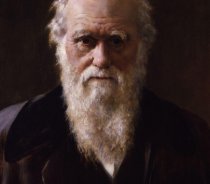wikimedia commons
Charles Darwin in 1881, 22 years after he wrote "On the Origin of Species" and one year before his death.
If he were still alive today, Charles Darwin would be proud of us. He’d also be 204 years old. But hey, he did coin the idea of survival of the fittest. Maybe he used his insight to discover the secret of eternal life and is currently surviving in great fitness on some tropical island in the Galapagos Archipelago. That’s pretty unlikely, but at least Darwin can rest easy knowing he made a pretty big impact on our world. Charles Darwin, of course, is the father of the theory of evolution. He traveled the world and viewed all different kinds of organisms, wrote a ground-breaking book “On The Origin of Species, ” and changed scientific thought forever. He ascertained that all Earth’s species are descended from common ancestors, and through the process of natural selection, have been adapting and evolving and often becoming extinct, since the beginning of life. Simply put: if you can’t adapt to changes, your species is a goner.
So why would Darwin be proud of us? Darwin laid the foundation for a school of thought that we’ve built on exponentially. Darwin’s ideas have touched on a great many aspects of modern-day humans’ lives. Science, of course, has benefited tremendously. In the field of paleontology: the idea of evolution has shed light on fossils, and vice versa. Biologists have learned about what it is that makes a species thrive, and how ecosystems and the species in them become extinct because of natural selection. Human psychology only ultimately makes sense in the context of evolution: we do what we do and think how we think because of that innate drive to survive. It isn’t just science. Literature, technology, music, politics, religion—you name it—the theory of evolution is pervasive in our society, and who do we have to thank for that? Charles Darwin.






